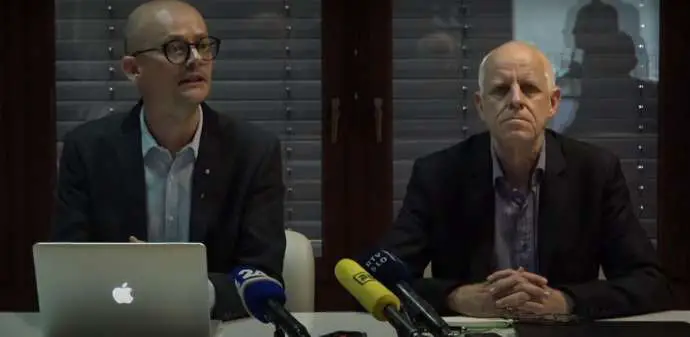STA, 6 October - President of the European Federation of Journalists (IFJ) Mogens Blicher Bjerregaard has warned that media freedom is deteriorating in several European countries, including Slovenia. He has thus called on the European Commission and EU member state leaders to take a stand and call on their counterparts to support media and journalist freedom.
Speaking at a press conference in Ljubljana on Wednesday as the Media Freedom Rapid Response (MFRR) delegation wrapped up its visit to Slovenia, Bjerregaard said "it is not only about Slovenia, but about Europe."
Considering the deterioration of media freedom in some European countries in the last 15 years, and the expansion of the trend to an increasing number of countries, it needs to be noted how important it is to stop this, he added.
"It is thus important for Europe what is going on in Slovenia, Hungary and Poland," Bjerregaard said, adding that political leaders should be aware that free media were the fundamental pillar of democracy, as they provided relevant information.
"We don't need state leaders to tell us how journalists should work and how they should behave. We need leaders who will protect freedom of media and freedom of speech," he said.
The full press conference can be seen belowBjerregaard welcomed the European Commission's plan to overhaul legislation on media freedom. "So far, letters were coming from the Commission, there were a lot of words, which has not helped. In Poland, in Hungary the media are still in the same situation and the situation in Slovenia will deteriorate if nothing happens."
According to the IFJ president, the planned measures would allow the EU to intervene in a member state where media freedom would be breached, which has not been possible so far.
One of the practical possibilities for implementing such measures would be, for instance, a special fund at the EU level from which media who found themselves in a situation like the Slovenian Press Agency (STA) could draw funds for survival.
Bjerregaard noted that words uttered by leaders had weight. "We have seen in many countries that state leaders created an environment of intimidation of journalists with their rhetoric."
He thus called on the European Commission and the leaders taking part in the EU-Western Balkans summit in Slovenia to issue a joint call to their colleagues to support media and journalist freedom.
He said when the countries that used to be under the influence of the Soviet Union joined the EU there was a clear plan that the state media there would become public media. But now we see in some countries public media returning into state media, he said.
When that happens, such media are no longer free or independent, but instead leaders use the media outlet for their propaganda, he said, but added that he did not claim this was the fate of the STA or RTV Slovenija, but there was a risk.
Jamie Wiseman of the International Press Institute said the state of the media freedom in Slovenia, Poland and Hungary differed, but there were key elements linking those three countries.
He listed smear campaigns against professional and critical journalists, attributing ideological and political bias to media, polarisation of media and journalists, attacks on independent journalists at press agencies, and advertising manipulation by the state and state companies.
These are different forms of pressure, they are happening in all three countries and the model was established by Orban and his Fidesz party.
While it is still a long way for Slovenia to come into the situation that Hungary or Poland are in now, Wiseman said it was cause for concern to see the patterns and pressures repeated in Slovenia.
Despite the pressure, Slovenia still has a lively independent media scene and places high in media freedom rankings and there is great support and solidarity of the Journalists' Association and Trade Union. But just because the media landscape is on a such a high level in Slovenia it means that if attacks happen here, they can happen anywhere, warned Wiseman.
MFRR REPORT: Press Freedom Deteriorating in Slovenia under Latest Janša Government







